Jeremy Thoms - Interview
by John Clarkson
published: 14 / 2 / 2021
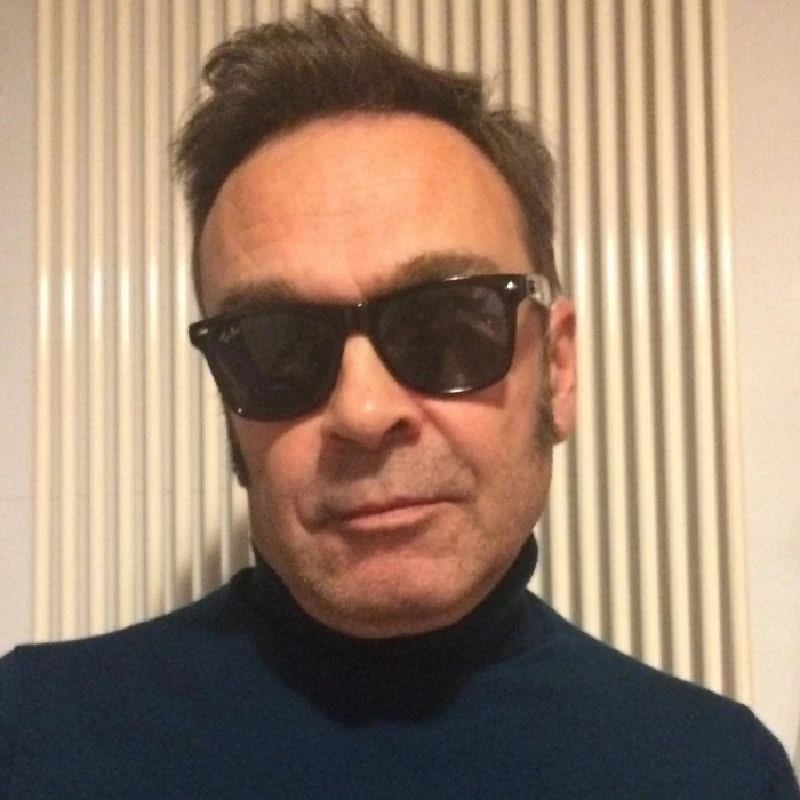
intro
Edinburgh-based singer-songwriter Jeremy Thoms talks to John Clarkson about the reissue of his early 1980's band the President Men's two singles and his 1990's group New Leaf's debut album 'On Safari'as well as his plans for his label Stereogram Recordings and band the Cathode Ray.
Jeremy Thoms has been a prolific presence on the Scottish independent and alternative music scene for forty years, fronting some of his many bands and playing guitar and keyboards in others. Thoms formed the Presidents Men, the first band in which he sung and played guitar, as an eighteen-year old in his native Aberdeen in late 1979. They signed to a local label, Oily Records, and released two singles of spiky pop, ‘Out in the Open’ (1980) and ‘Reasons for Leaving’ (1981). After the Presidents Men split, Thoms moved to Edinburgh in 1982. He has since then been in a wide variety of other groups including new wave band the Strawberry Tarts, electronic/dance act Paparazzi, the 60’s-influenced Naturals, and country/alt. pop acts New Leaf and Skyline. He also played keyboards on two mid-80’s tours with the Revillos, and was also a guitarist in much acclaimed indie band Jesse Garon and the Desperados. For the last fifteen years and since 2006 he has fronted the Cathode Ray. The Cathode Ray, which also at first involved ex-Josef K member Paul Haig, began with the blueprint of marrying 70’s New York acts such as the Velvet Underground and Television with those of Mancurian outfits such as Joy Division, Magazine and the Fall. It has since expanded its initial punk and post-punk sound and incorporated them with a wide variety of other styles and genres including pop, psychedelia, glam rock, disco, folk and reggae. It has now released three albums, ‘The Cathode Ray’ (2011), ‘Infinite Variety’ (2015) and ‘Heightened Senses’ (2019). Since 2011, Thoms has also successfully run a record label Stereogram Recordings, which, initially conceived as an umbrella label for the Cathode Ray, has since gone on to showcase and release albums and singles by a diverse set of mainly Scottish acts including singer-songwriter and poet Roy Moller, prog/psychedelic band the Eastern Swell, alt. country balladeers St Christopher Medal and noise act STOOR. Although we have known each other for a decade and live half a mile apart, pandemic restrictions made it not possible for us to meet up, and this interview was conducted by phone. Despite lockdown, Thoms is very busy. He has written all the material for the Cathode Ray’s fourth album, and he has resurrected for the first time in five years his Brel-influenced cabaret pop outfit the Fabulous Artisans, which also features singer and actor Neil Crossan. The Fabulous Artisans released two digital-only singles at the end of last year, ‘Nothing Ventured, Nothing Gained’ and ‘Best Christmas’, and are now working on a long-awaited second album to accompany their 2008 debut LP, ‘From Red to Blue’. Thoms is also planning to reissue digitally on Stereogram in March for their fortieth anniversary the two Presidents Men singles. At the end of last year Stereogram Recordings also released New Leaf’s debut album, ‘On Safari’ (1995) in a remastered 25th anniversary digital version and on limited edition CD. A songwriting partnership between vocalist Andy Kelly and Thoms, ‘New Leaf was a sextet which was formed in 1993, and also released two other albums, ‘Stereophonic’ (1997) and ‘Panorama’ (1998). An eclectic, semi-orchestral album involving string and brass arrangements and over a dozen musicians, ‘On Safari’ includes tracks such as breezy country number ‘Travelling Man’, the soul-drenched six minute plus ‘All Washed Up’ and the jazz-influenced ‘Bookends’. Pennyblackmusic spoke to Jeremy Thoms about the Presidents Men and New Leaf reissues and his future plans. PB: You are re-releasing digitally the two Presidents Men singles which came out originally in 1980 and 1981. What do you make of the young man singing ‘Out in the Open’ and ‘Reasons for Leaving’ now? JEREMY THOMS: I like them, but I don’t feel that they have a very cohesive sound. The whole thing happened very fast, and we were very young. We were only eighteen and nineteen, and you can hear on them that we were obviously trying to feel our way. The A sides in particular are good though. ‘Out in the Open’ has a ‘White Light/White Heat’ thing going on, and ‘Reasons for Leaving’ has these massive tribal drums. You can hear Adam Ant and the Banshees and Bow Wow Wow in there who were big at the time on it. Some of it was very obviously influenced by things around us, and other things weren’t. There are some interesting things going on. It was very much a band composition, and Roy Ingram’s guitar playing, Donald (Macdonald)’s bass riff, and the drummer John (Watson’s) drum rhythms with my lyrics on top have all got something original. PB: The Presidents Men were very successful very quickly, attracting steady local audiences in Aberdeen and signing to Oily Records within six months of forming. Was it a case of being a big fish in a small pond? JT: To a certain degree, yes. It really did happen very quickly. Our very first gig was December ’79 and by March Oily was showing an interest in putting out a single. We didn’t really know how to play the game. We were feeling our way really, but it was great when it all happened. PB: What was the biggest lesson that you learnt from being in the Presidents Men? JT: With the benefit of hindsight and if I was able to do it all over again, I would have never split up the band so quickly. I assumed that it was always going to be that easy to attract success. What happened was our guitar player Roy left. He finished art college in ’81 and suddenly upped sticks. Music obviously wasn’t his thing, and he decided he was going to move to London to fulfill his artistic career. We struggled on for a wee bit as a three piece, and first of all I decided to write a whole new set of songs which was absolute madness. I ditched everything and then I split the band up and formed the Strawberry Tarts. What I should have done, which would have been the more pragmatic, sensible thing, was to get a new guitarist in, keep the set and remain with Oily Records, but I was too hot-headed and decided that I was going to do something else. PB: You moved down to Edinburgh. Why did you decide to come to Edinburgh rather than Glasgow? JT: It was both a musical decision as well as a personal one. It was based on my feeling that more interesting things were happening in Edinburgh. I had more friends and more family contacts here, but I wonder what would have happened if I moved to Glasgow. Things could have taken a completely different course in terms of who I met. My girlfriend of the time was here. She was at art college, so I was down here a lot anyway, and Tony Pilley, who recorded and produced the two Presidents singles, was here. My sister had also been at art college in Edinburgh, and I knew more people here than in Glasgow. I certainly don’t regret it. I am glad that it happened. PB: You have had an on-off relationship with being a frontman, have been so in the Presidents Men and the Cathode Ray, but handed the vocals over to other people in New Life, Skyline and the Fabulous Artisans. Is it something that you will do when there is nobody else more suitable? JT: I do like to collaborate, and with the Fabulous Artisans, for example, I do know when there are songs that will suit Neil when he is singing them. He has a wonderful voice. It gives me more freedom to be eclectic. The Cathode Ray is more personal to me. I tend to be more personal I guess with the lyrics, but when I am doing something like the Fabulous Artisans, or, as was also the case with New Leaf, I can generalise more. PB: Why do you think the Cathode Ray has been so long-lasting? You were in the Presidents Men, for example, for two years and New Leaf for five years, and most of your other projects have just lasted a few ears, but you have been in the Cathode Ray for fifteen years now. JT: I was quite surprised when I realised that we had been going that long (Laughs). I think the secret is that we don’t see that much of each other, and we take long breaks. Every other band has been quite intensive. New Leaf began in 1993 and our last gig was in 1998, and we were writing and gigging and recording solidly. I wouldn’t say that we burnt out, but I wanted to do something else. With the Cathode Ray, we keep things fresh by taking long gaps in the amount that we see of each other, and when we do it has rejuvenated itself. The fact that we also live in different parts of the country also helps. Dave Mack, our drummer, moved away from Scotland for work shortly after the Cathode Ray started and now lives in Yorkshire. I like going down there at weekends to work on material, and likewise he likes to get away and come up to Scotland. It works because it has always been ongoing and not too intensive. We have never toured extensively, so it has always been a slow-burning thing that we still want to do. PB: Do you see yourself primarily as a songwriter, a musician or a label owner? JT: I juggle all three, but I have always regarded myself first of all a songwriter and a musician because I only formed the record label as a way to get my music out, and then it grew legs (Laughs). I ended up running the record label by accident. It takes up a lot of energy and is hard work, but I have really enjoyed it. PB: New Leaf swum against the tide of everything else that was fashionable in the mid-90s such as Brit Pop, and ‘On Safari’ combined elements of easy listening, folk/country, soul and jazz. Was that a conscious decision or was that what you ended up sounding like? JT: It was a bit of both. The whole Brit Pop thing became terribly generic, and I just found it irritating (Laughs). There were too many bands which sounded like Oasis and Blur. I suppose subconsciously I didn’t want to do that. A lot of people said to me at the time, “You’re mad. You’re always going against the grain. Why not make it easy for yourself? Why don’t you put a Union Jack behind you?” I had all these ideas for songs, and I was writing jazz songs and I was writing country songs and I thought, “Why not?” I just wanted to be as varied as possible. PB: How did you and Andy Kelly write the songs in comparison to what you do now in the Cathode Ray? JT: It was quite different. Some of the songs were just written by myself on my own, but i was very much writing with Andy in mind. If I was writing on my own, I was very much thinking of him. Andy and I worked very naturally together. Several of the songs on ‘On Safari’ were written in one afternoon (Laughs). They weren’t written completely from scratch. Andy might have the chords and I might have the melodies or something like that, but they came together so quickly. I always think that the best songs are like that. Any songwriter I know will tell you that. You can work on things, but the initial idea has to be there from the beginning. Andy and I wrote in an unique way. Lots of musicians writing together split the music from the lyrics, but we worked together on the music and the lyrics. We sat in a room together and worked on honing things down. Andy has also got a great soul voice, which again gave me a lot of freedom. It wouldn’t have suited the Cathode Ray and it wouldn’t have worked with me singing it, but I knew that having a voice like that I could again do bigger and bolder things. It was like working with Neil Crossan in the Fabulous Artisans. You think, “Wow! I can do this.” PB: As ‘On Safari’ was so different to much else of what was going on in the ‘90s, it has not dated at all and has a timeless quality, hasn’t it? JT: That’s the way I see it. It wasn’t in fashion then but the good thing about not being in spec is that you are not rooted to a moment. I think it could have been made at any point in the last fifty years. PB: New Leaf were very successful in Japan, and your brother-in-law Yoshiro Oyama, who managed New Leaf and ran your then label Foundation Recordings, was able to get you a deal with Sony/Epic there. How did that happen? JT: Over here all the A & R men were sniffing around the next Oasis. Yoshi was a stained glass artist, and he had been commissioned by the CEO of Sony in Japan to do a piece of stained glass He was in Japan sorting out these stain glass windows, and he said to the CEO, “ My brother-in-law is in a band. Can you get his music to the right people?” and the good thing about Japan is that it is very much about honour over there. There is not the same bullshit that happens in Britain, so what happened is the CEO said, “I will take it to the right person,” and the right person may not have liked it, but he loved it. My only regret with it is that we could have done so much more with it. We should have taken the opportunity to tour over there, but it was quite an expensive thing to do and people had jobs. Although we sold fairly well and were displayed in the front window in HMV in Tokyo. it didn’t happen. There was a real distance, but it really gave us a momentum and an impetus. It was a really great time. It was a three album deal, and there is nothing like that to push you on. It was a brilliant five years. PB: Were your second and third albums, ‘Stereophonic’ and ‘Panorama’ ever released in the UK? JT: No, they never were. The 25th anniversary of the reissues is going to be ‘Stereophonic’ next year and ‘Panorama’ two years after that, and they have only ever been available on import. We will be releasing them digitally, but we might do a short run of physical copies through Stereogram. PB: The Fabulous Artisans have been prolific recently with two new songs. Do you hope to release more material? JT: Neil and myself have been through endless delays, but things are speeding up a bit and I have got four or five backing tracks all completed and ready to go, and Neil will be doing some remote recording. Whether or not some of it will be mopping up the singles or it will be all new material remains to be seen, but the plan is maybe this year and certainly next year that there will be a second Fabulous Artisans album. PB: What are your plans for Stereogram Recordings for 2021? JT: Chris Reeve from the Eastern Swell will be doing a solo album. Chris keeps sending me songs and I will be producing it, but we need to record it still and that depends on how things work out with the pandemic. It is an album which needs recorded live in a room, but I am hoping if restrictions are lifted we may be able to crack on with that in the spring or summer. St. Christopher Medal also recorded an EP before the first lockdown, and that will be coming out this year. When restrictions got lifted during the summer, STOOR got together and they are quite far on with their third album, so that may also be happening. PB: And finally what about the Cathode Ray? Do you have anything coming out this year? JT: I have written and demoed the next album, which will have ten tracks and has gone out to the band. We are going to pick one of them and hopefully release a single this year. PB: Thank you.
Play in YouTube:-
Picture Gallery:-
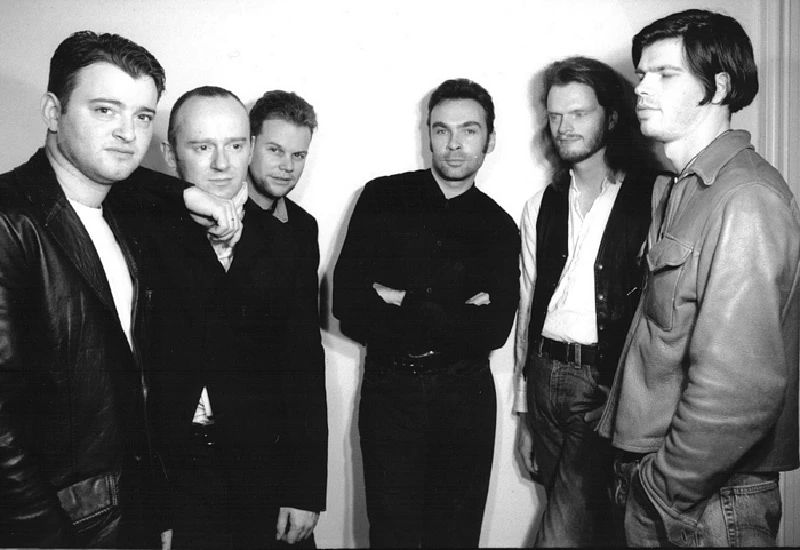
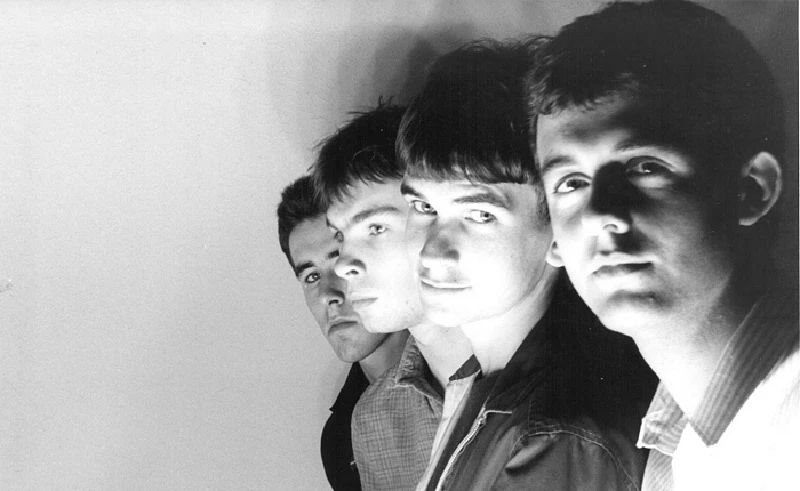
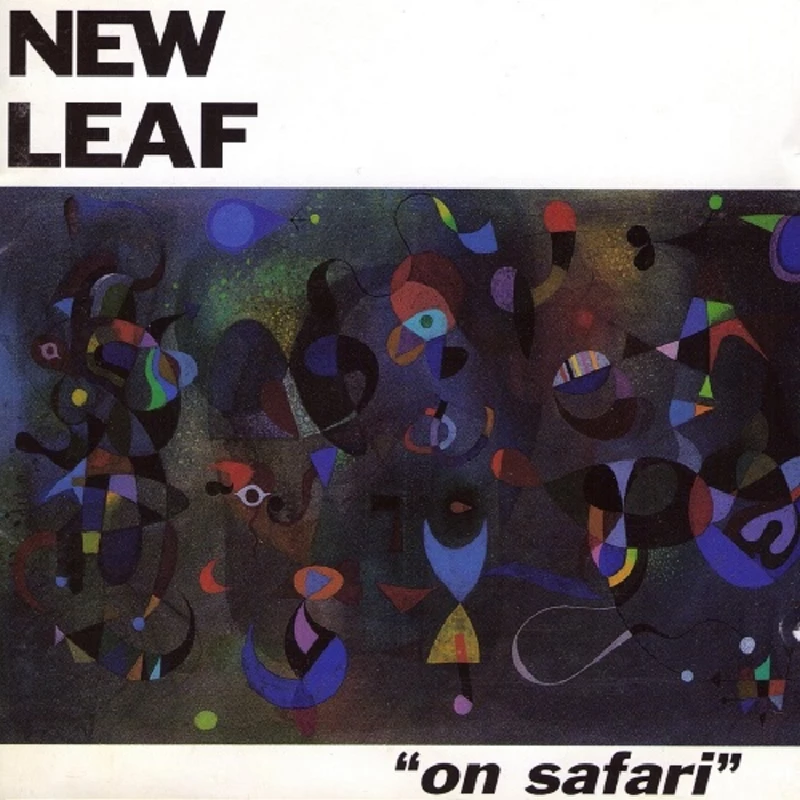
features |
|
Vinyl Stories (2018) |
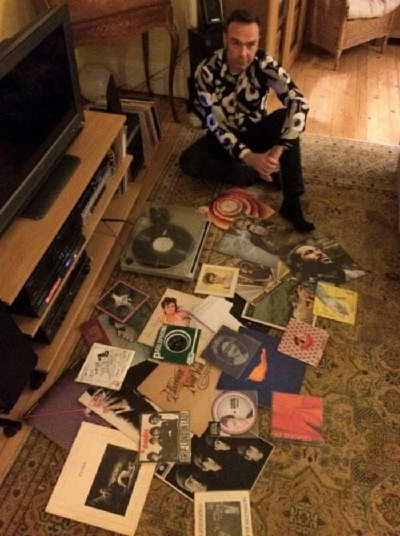
|
| Dave Goodwin in his regular column 'Vinyl Stories' speaks to multi-musical man, Stereogram Records owner and Cathode Ray frontman Jeremy Thoms about his vinyl records. |
most viewed articles
current edition
Carl Ewens - David Bowie 1964 to 1982 On Track: Every Album, Every SongArmory Show - Interview with Richard Jobson
Bathers - Photoscapes 1
Visor Fest - Valencia, Spain, 26/9/2025...27/9/2025
Colin Blunstone - Thalia Hall, Chicago, 16/7/2025
Billie Eilish - O2 Arena, London, 10/7/2025
John McKay - Interview
Robert Forster - Interview
Loft - Interview
Sir Tim Rice - Interview
previous editions
Heavenly - P.U.N.K. Girl EPManic Street Preachers - (Gig of a Lifetime) Millennium Stadium, Cardiff, December 1999
Oasis - Oasis, Earl's Court, London, 1995
Beautiful South - Ten Songs That Made Me Love...
Trudie Myerscough-Harris - Interview
Pixies - Ten Songs That Made Me Love...
Paul Clerehugh - Interview
Doris Brendel - Interview
Prolapse - Interview
Simon Heavisides - Destiny Stopped Screaming: The Life and Times of Adrian Borland
most viewed reviews
current edition
Amy Macdonald - Is This What You've Been Waiting For?Sick Man of Europe - The Sick Man of Europe
Phew, Erika Kobayashi,, Dieter Moebius - Radium Girls
Alice Cooper - The Revenge of Alice Cooper
Davey Woodward - Mumbo in the Jumbo
Lucy Spraggan - Other Sides of the Moon
Blueboy - 2
Cynthia Erivo - I Forgive You
Vinny Peculiar - Things Too Long Left Unsaid
Philip Jeays - Victoria
Pennyblackmusic Regular Contributors
Adrian Janes
Amanda J. Window
Andrew Twambley
Anthony Dhanendran
Benjamin Howarth
Cila Warncke
Daniel Cressey
Darren Aston
Dastardly
Dave Goodwin
Denzil Watson
Dominic B. Simpson
Eoghan Lyng
Fiona Hutchings
Harry Sherriff
Helen Tipping
Jamie Rowland
John Clarkson
Julie Cruickshank
Kimberly Bright
Lisa Torem
Maarten Schiethart